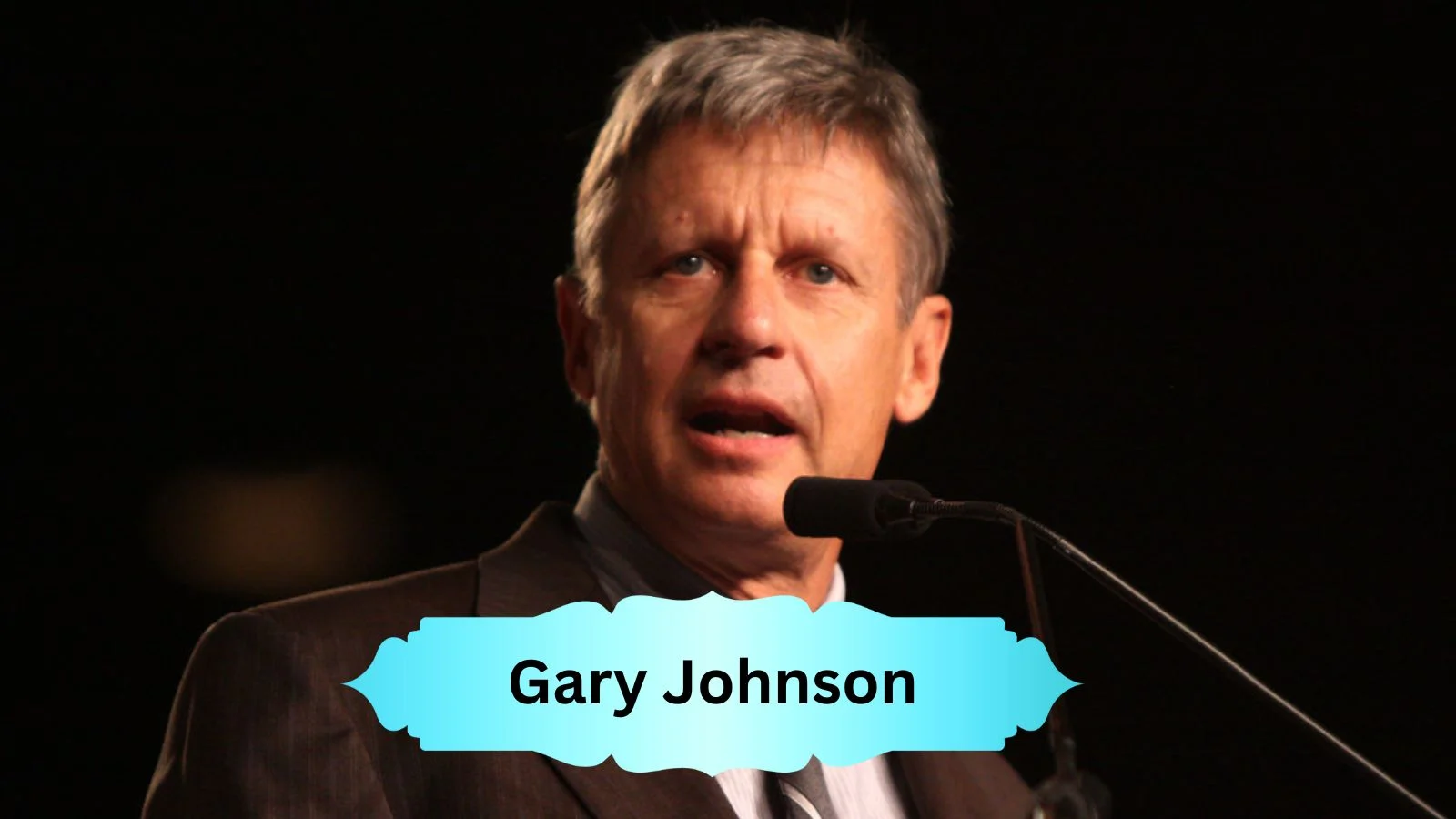Gary Johnson’s story isn’t your typical political biography — it’s a blend of grit, adventure, and a relentless belief in personal freedom. Born in the icy plains of North Dakota and raised under the bright skies of New Mexico, he went from a self-made construction magnate to a two-term governor who balanced budgets without raising taxes.
Along the way, he climbed Mount Everest, competed in grueling triathlons, and challenged America’s two-party system head-on. Whether you remember him as the “Governor No” with 750 vetoes or the Libertarian presidential hopeful who refused to play by Washington’s rules, Johnson has always marched to the beat of his own drum.
His career is packed with bold decisions, unshakable principles, and a few headline-making missteps. Love him or disagree with him, Gary Johnson has left a mark on American politics that’s as unconventional as it is unforgettable.
Early Life and Family Background of Gary Johnson
Gary Earl Johnson was born on January 1, 1953, in Minot, North Dakota, U.S. He grew up in a working-class household — his father was a carpenter and his mother a housewife. This modest upbringing would shape his pragmatic approach to life and politics. Johnson often recalls working alongside his dad on building projects, learning the value of self-reliance early on.
Quick Facts Table:
| Detail | Information |
| Full Name | Gary Earl Johnson |
| Date of Birth | January 1, 1953 |
| Birthplace | Minot, North Dakota |
| Father’s Occupation | Carpenter |
| Mother’s Occupation | Housewife |
| Political Affiliation | Libertarian Party (formerly Republican) |
Growing Up in Minot, North Dakota and New Mexico
When Johnson was still a child, the family relocated to New Mexico, where the sunny climate and open landscapes suited their lifestyle. He excelled in sports, especially skiing and cycling, foreshadowing his later feats in endurance competitions.
Neighbors remembered him as “a no-nonsense kid who liked to fix things”, whether it was a broken bike or a leaky faucet.
College Years and Political Science Degree
Johnson attended the University of New Mexico, earning a Bachelor’s degree in Political Science in 1975. While many peers went straight into law or public policy, he took a detour — starting a handyman business with nothing more than a few tools and grit.
University Snapshot:
| University | Degree | Year |
| University of New Mexico | B.A. Political Science | 1975 |
Building a Career as a Handyman and Construction Entrepreneur
What started as small repair jobs turned into Big J Enterprises, a construction firm that grew to employ over 1,000 people. By 1999, Johnson sold the company for $10 million, achieving financial independence long before his governorship.
He often said:
“I didn’t run for office because I needed a job. I ran because I thought I could make government smaller and more efficient.”
The 1994 New Mexico Governor Campaign: A Political Outsider’s Victory
In 1994, Johnson entered politics as a Republican outsider. He won the governorship of New Mexico against all odds, running on a fiscally conservative platform.
Campaign Highlights Table:
| Year | Opponent | Margin of Victory | Notable Issues |
| 1994 | Bruce King (Democrat) | Narrow win | Budget cuts, smaller government |
Fiscal Conservatism and Balancing the State Budget
As governor from 1995–2003, Johnson balanced the budget without raising taxes, a feat few governors could claim. He frequently vetoed bills he deemed wasteful — earning the nickname “Governor No”.
Budget Record:
| Term | Budget Status | Taxes Raised? |
| 1995–2003 | Balanced every year | No |
Veto Power: 750 Bills and the “Governor No” Nickname
Johnson used his veto pen 750 times — more than all other governors combined during his tenure. His approach was rooted in the belief that less government equals more freedom.
Marijuana Legalization and Drug Policy Reform
In 1999, Johnson became the highest-ranking U.S. official to openly advocate marijuana legalization. This stance, controversial at the time, eventually aligned with shifting public opinion.
Policy Position Table:
| Substance | Johnson’s View | Reason |
| Marijuana | Legalize, regulate, tax | Reduce crime, increase revenue |
| Hard Drugs | Decriminalize possession | Focus on treatment over punishment |
Immigration Reform and Libertarian Perspectives
Johnson supports simplified immigration laws and an expanded work visa program. He rejects mass deportations, calling them both impractical and inhumane.
The Shift from Republican to Libertarian Party
In 2011, frustrated by the Republican Party’s stance on civil liberties, Johnson switched to the Libertarian Party. This shift allowed him to run on a platform emphasizing personal freedom, fiscal restraint, and non-interventionist foreign policy.
2012 Presidential Campaign and National Exposure
Johnson’s 2012 Libertarian presidential run earned him 1.3% of the national vote — the highest for a Libertarian candidate since 1980 at the time. His running mate was Judge Jim Gray from California.
2016 Presidential Run: Polling, Debates, and the Aleppo Moment
In 2016, Johnson’s ticket with William Weld garnered 3.27% of the popular vote. However, the campaign is often remembered for the “What is Aleppo?” moment during an MSNBC interview.
Policy Positions on Taxes, the IRS, and Federal Agencies
Johnson advocates eliminating the IRS and replacing the tax code with a national consumption tax. He has also called for dismantling federal agencies like the EPA.
Gary Johnson on Social Issues: Abortion, Firearms, and Civil Liberties
Johnson supports a woman’s right to choose, Second Amendment rights, and marriage equality. His positions are consistent with a libertarian emphasis on personal autonomy.
Views on Foreign Policy, Syria, and the Role of the Military
Johnson opposes military intervention except in cases of direct threat to the U.S. He opposed U.S. involvement in Syria’s civil war.
Athletic Achievements: Triathlons, Mountain Climbing, and Everest
Johnson is an accomplished athlete, having completed Ironman triathlons and summited Mount Everest in 2003 — despite losing toes to frostbite.
Athletic Feats Table:
| Event | Year | Note |
| Everest | 2003 | Lost toes to frostbite |
| Ironman Triathlon | Multiple | Top finishes |
Business Ventures Including Cannabis Sativa, Inc.
Post-politics, Johnson served as CEO of Cannabis Sativa, Inc., advocating for marijuana industry growth.
Gary Johnson’s Relationship with Libertarian Leaders and Donors
Johnson has been connected to figures like David Koch and Ron Paul, reinforcing his role in the libertarian movement.
Legacy in the Libertarian Movement and U.S. Politics
Johnson’s runs in 2012 and 2016 helped bring third-party politics into mainstream conversation.
Criticism, Controversies, and Media Portrayals
Critics have called him underprepared on foreign policy. Supporters counter that his honesty and consistency outweigh occasional gaffes.
Personal Life: Marriages, Relationships, and Hobbies
Johnson has been married, divorced, and engaged multiple times. His hobbies include skiing, biking, and gardening.
Lessons From Gary Johnson’s Political Journey
Johnson’s career shows that authenticity and persistence can make a mark even outside the two-party system.
How Gary Johnson Influenced Modern Third-Party Politics
His campaigns proved that Libertarian ideals could resonate with millions of voters.
Gary Johnson in Popular Culture and Public Perception
Johnson has been depicted in political cartoons, talk shows, and late-night comedy segments, often emphasizing his laid-back demeanor.
FAQs
Q1: What states did Gary Johnson govern?
A1: He served as the Governor of New Mexico from 1995 to 2003.
Q2: How many times did he run for president?
A2: Twice — in 2012 and 2016.
Q3: What was Gary Johnson’s profession before politics?
A3: He was a construction entrepreneur.
Q4: Is Gary Johnson still involved in politics?
A4: Not actively in office, but he remains a libertarian advocate.
Q5: Did Gary Johnson climb Mount Everest?
A5: Yes, in 2003, despite suffering frostbite.
Conclusion
Gary Johnson’s life is a study in determination, independence, and the pursuit of personal freedom. From his small-town roots to two presidential campaigns, he’s proven that you don’t need to fit the political mold to make an impact. Whether balancing a state budget, vetoing wasteful bills, or scaling Mount Everest, Johnson embodies the libertarian spirit: live and let live.












